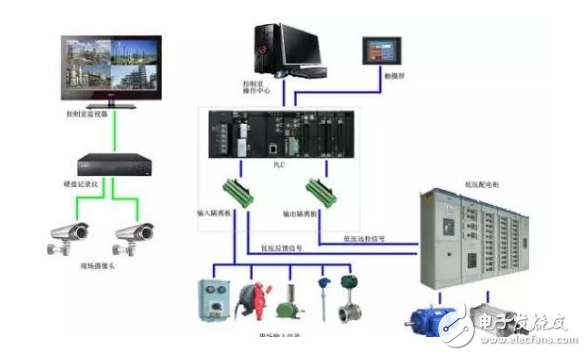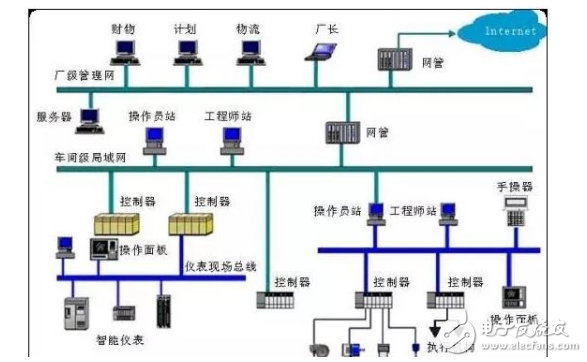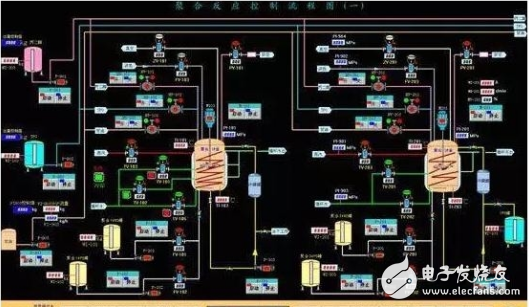DCS usually adopts hierarchical hierarchical structure, each level consists of several subsystems, each of which implements certain specific finite targets to form a pyramid structure.
Reliability is the life of DCS development. There are three main measures to ensure the high reliability of DCS: one is the extensive application of high-reliability hardware equipment and production technology; the second is the extensive use of redundancy technology; the third is widely implemented in software design. System fault tolerance technology, fault self-diagnosis and automatic processing technology. Most of today's distributed control systems have MTBFs of tens of thousands or even hundreds of thousands of hours.
DCS hardware architectureInvestigating the hierarchical structure of DCS, DCS level and control management level are the two most basic links that make up DCS.
The process control level specifically implements decentralized control functions such as input, transformation, operation, and output of signals. In different DCS, the control devices of the process control level are different, such as the process control unit, the field control station, the process interface unit, etc., but they are basically the same in structure and can be collectively referred to as the field control unit FCU. The process management level consists of an engineering station, an operator station, a management computer, etc., and completes centralized monitoring and management of the process control level, usually called an operation station. The hardware and software of DCS are designed according to the modular structure. Therefore, the development of DCS is actually to combine various basic modules provided by the system into one system according to actual needs. This process is called system configuration.
(1) Field control unit
The field control unit is generally remote from the control center and installed close to the site. Its highly modular structure can be configured as a process control unit of several scales from several monitoring points to hundreds of monitoring points according to the needs of process monitoring and control.
The structure of the field control unit is installed in the plug-in box by a number of functionally dispersed boards (or cards) in a certain logical or physical order, and each field control unit and its connection with the control management stage are connected by bus. Implement information interaction.
The hardware configuration of the field control unit needs to complete the following:
The configuration of the plug-in configures hardware devices such as host plug-ins (CPU plug-ins), power plug-ins, I/O plug-ins, communication plug-ins, etc. according to system requirements and control scales;
Hardware Redundancy Configuration Redundant configuration of critical devices is an important means of improving DCS reliability. DCS can usually be redundantly configured for host plug-ins, power plug-ins, communication plug-ins and networks, and key I/O plug-ins.
The hardware installs different DCS. For the installation of various plug-ins in the plug-in box, there will be corresponding rules in the logical order or physical order. In addition, the field control unit is usually divided into basic type and extended type. The so-called basic type is that various plug-ins are installed in a plug-in box, but more often, an expandable structure is needed, that is, a field control unit also includes A number of digital input/output expansion units are connected to each other by a bus.
In essence, the structural form and configuration requirements of the field control unit are consistent with the hardware configuration of the modular PLC.
(2) Operation station
The operation station is used to display and record the process data from each control unit, which is an operation interface for the person to interact with the production process information. Typical operation stations include host systems, display devices, keyboard input devices, information storage devices, and printout devices. They mainly implement powerful display functions (such as analog parameter display, system status display, multiple screen displays, etc.) and alarm functions. , operating functions, report printing functions, configuration and programming functions, and more.
In addition, the DCS operator station is divided into an operator station and an engineering station. From the perspective of system function, the former mainly implements general production operations and monitoring tasks, and has functions such as data acquisition and processing, monitoring screen display, fault diagnosis and alarm. In addition to the general functions of the operator station, the latter should also have the functions of system configuration and control target modification. From the perspective of hardware devices, the engineering stations and operator stations of most systems are combined and distinguished by only one engineer's keyboard.
DCS belongs to the fourth generation of industrial control systems and is the abbreviation of English Distributed Control System, which means distributed control system, also known as distributed control system. DCS is a multi-level control computer system. Its technical composition includes computer technology, communication technology, display and control technology. The system structure is divided into process control level and process monitoring level.
DCS was developed and developed in the 1970s. It has attracted great attention in the field of industrial control and has been highly evaluated. It has been widely used in industrial control fields all over the world. This paper describes the application of DCS control system in the chemical industry.
First, the structure and characteristics of the DCS control systemThe composition of the structure of the DCS control system:
From the perspective of system structure, DCS is divided into process level, operation level and management level.
The process level is the main implementation part of the control function of the DCS control system, including the process control station, I/O unit and various field instruments; the operation level is responsible for completing the operation and configuration of the system, including the operator station and the engineering station; The level is an integrated management system, a high-level application of DCS, and an integrated system from enterprise production control to information management. At present, in general industrial applications, it is mainly composed of process level and operation level. The DCS control system with management level is still relatively rare in practical applications, especially in some enterprises with small and medium-sized enterprises. Management level is even rarer.
Process level: responsible for the implementation of the DCS control system, the process control station completes the DCS control decision, is the system's execution unit, consists of a complete computer system, including the power supply, central processing unit, network interface and input and output modules.
Operation level: including operator station and engineering station. The function of the operator station is to handle all human-machine interfaces related to the operation of the system; the engineering station is responsible for offline configuration, configuration and online supervision, control and maintenance of the DCS system, for system configuration and parameter setting, the system Engineers are all carried out through engineers.

DCS is a distributed control system. The design of the system reflects the basic idea of ​​decentralized control, centralized operation and group management. The DCS control system is flexible in configuration and convenient in configuration. The specific features are as follows:
1 has high reliability characteristics
The DCS control system disperses the control functions on each computer. Each computer undertakes a single system task, so that when any computer of the system fails, it will not have a major impact on other computers in the system, and this structural mode A dedicated computer can be used to implement the functional requirements for the system requirements, so that the performance of the computer in the system is greatly improved, and the system reliability is improved.
2 open system features
The DCS control system adopts a standardized and modular design, and independent computers in the system communicate with each other via Industrial Ethernet. The standardized and modular design makes the system open. Each subsystem can be easily connected to the control system. It can also be uninstalled and exited from the system network at any time. It will not affect other subsystems or computers, and the system is in progress. It is very convenient to expand and adjust functions.
3 system maintenance is simple and convenient
The DCS control system consists of a single or small computer with a single function. Each computer is independent of each other. Local faults do not affect the functions of other computers. It can detect and eliminate fault points without affecting system operation. It is easy to maintain. Convenient features.
4DCS control system is flexible and fully functional

The DCS control system can realize continuous and sequential control, which can realize cascade, feedforward, decoupling, adaptive and predictive control. The system is very flexible and can be composed of management station, operator station, engineer station, field control station, etc. The composition can also be composed of a server, a programmable controller, and the like. The process level is usually performed by the field control station and the data acquisition station to perform on-site data collection and transmitted to the operation level computer through the communication network. The operation level implements centralized operation of process data, including data optimization, statistics, fault diagnosis, display, and alarm. In a management-class system, DCS can also connect with higher-level management systems according to the overall management needs of the enterprise, and realize centralized management and operation of other management functions of the enterprise.
Second, the selection of DCS control system for chemical companiesThe first problem that should be considered in the selection of DCS control system for chemical enterprises
1 Project size and nature
The selection of DCS control system should first consider the scale and nature of the project. The design of the system can be divided into large-scale projects and small- and medium-sized projects according to the scale of the project. According to the nature of the project, it can be divided into new projects and renovation projects.
For large-scale projects, whether it is new construction or expansion, consideration should be given to establishing an independent DCS network. The expansion and expansion projects should take into account the interface with the original DCS network and subsequent system expansion issues; for small and medium-sized projects, In the case, the original DCS control system network is the main one, and the data is integrated into it.
2 project master plan requirements
At the beginning of the establishment of the enterprise DCS control system, the overall design of the system should be planned. The main planning content is to systematically control the production operation of the enterprise or integrate the automatic control and information management system. System control of the production operation of the enterprise usually does not involve the management level, and establishes a control system with process level and operation level, which can basically meet the needs of the enterprise; and realize the integration of enterprise data information and enterprise resource management system. Optimization, it is necessary to establish a system of integrated automatic control and enterprise information management, so that enterprise production and management network, such a system usually has a three-tier structure, including enterprise resource planning, production operation management and process control.
3 technology advancement and applicability
The advancement and applicability of technology is one of the important conditions for the selection of DCS control systems. The advanced technology requires that the technology selection of the system should closely follow the development trend of DCS technology, and the technology should be advanced in a certain time range to avoid the loss of the system in the use cycle; the technical applicability requires the design of the system to be targeted, The actual situation and characteristics of the enterprise are designed to meet the needs of the enterprise, that is, the design of the system is required to ensure the rationality and applicability while achieving advanced technology.
Third, DCS control system selection recommendationsBased on the above-mentioned problems that chemical companies need to consider in the selection of DCS control systems, it is recommended to use an open DCS control system based on industrial Ethernet to meet the needs of the enterprise information management system for the overall management of the enterprise, and further for the subsequent DCS control system. Expanding to provide the foundation and space; considering that the fieldbus technology is still in the stage of development and improvement, the FF bus instrument cannot be used in the DCS system. Therefore, the system can be combined with the conventional smart meter by the field bus.

DCS is a complex control system that combines multiple technologies. In practical applications, system failure is inevitable. In the past experience, the common faults of the DCS control system are as follows:
1 power failure
The power failure is a problem that is more likely to occur in the DCS control system. The cause of the failure is also relatively high. The insurance configuration is unreasonable, the protection is malfunctioning, or the backup power supply is not self-injected, which may cause a power failure. Although there are many power failures, they are easier to handle and the cause of the faults is easier to find. For the prevention of power failure, the main purpose is to verify the capacity of the insurance configuration, and select the matching insurance capacity to make the insurance play a role; the UPS is very important for the normal power supply of the system. Full consideration of redundancy and standby issues.
2 interference failure
The interference fault of the DCS control system is usually the grounding problem of the system. The interference source generally has high-power communication equipment, and the start and stop of high-power equipment. For interference problems, the shielding and grounding requirements must be strictly implemented. The signal lines of the system should be kept away from the interference sources to prevent the interference signals from entering the system. High-power wireless communication equipment should be avoided in key parts such as electronic equipment and engineering stations.
3I/O card failure
I/O card failures usually occur more frequently during system commissioning and occur less frequently after the system is put into operation. At present, many I/O card manufacturers are engaged in the integrated manufacturing of card parts. Therefore, after handling such faults, after system diagnosis, the replacement parts are generally processed. The cause of the failure of the I/O card is not easy to judge, and the inspection is generally performed by the manufacturer.
DCS control has high reliability, openness, and convenient configuration and maintenance, which makes it widely used in various industrial fields. In chemical enterprises, the application of DCS control system has been relatively mature and perfect. As long as the design of DCS control system is reasonable, the advanced and superiority of DCS control system can be fully utilized to improve the automation production level of enterprises.
Panasonic Insertion Machine Parts
The Insertion machine can be divided into: a cross-line Insertion machine, an axial component Insertion machine, and a radial component Insertion machine.
Panasonic Insertion Machine Parts include Cutter, Ball Screw, WH Flex Cable, Photo Interrupt, Clinch Lever, Belt, Pallete,Shaft Assy,Guide,Scissors Unit etc.
Panasonic Insertion Machine Parts,Insertion Machine Fiber Sensor,Insertion Machine Solenoid Valve,Insertion Machine Solenoid Valve
Shenzhen Keith Electronic Equipment Co., Ltd. , https://www.aismtks.com